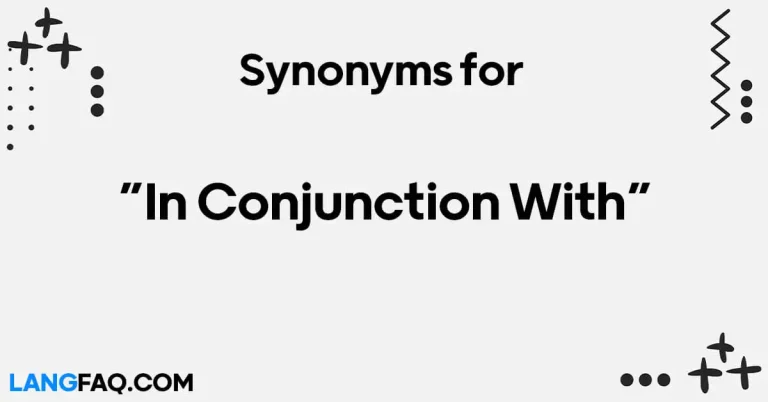Engaging in effective conversations is an essential aspect of daily life. However, repeatedly using the phrase “Per Our Conversation” might feel monotonous. In this article, we delve into 12 alternative expressions that not only convey the same message but also add flair and diversity to your communication toolkit.
12 Other Ways to Say “Per Our Conversation”
Here are 12 alternative ways to say “Per Our Conversation”:
- In accordance with our discussion
- As we discussed earlier
- Following our previous talk
- Building on our last conversation
- In light of our prior dialogue
- Reflecting our earlier exchange
- Pursuant to our talk
- Confirming our discussion
- As agreed upon
- In line with our convo
- Consistent with our chat
- Echoing our conversation
Here’s a table with meanings and examples for the 12 alternative ways to say “Per Our Conversation”:
| Expression | Meaning | Example |
|---|---|---|
| In accordance with our discussion | Acting in agreement with our previous conversation | The decision was made in accordance with our discussion. |
| As we discussed earlier | Referring to a point discussed in a prior conversation | Let’s proceed with the changes, as we discussed earlier. |
| Following our previous talk | In sequence with our last conversation | Following our previous talk, the team has decided to proceed. |
| Building on our last conversation | Developing ideas from a prior discussion | Building on our last conversation, let’s explore new strategies. |
| In light of our prior dialogue | Considering insights from our earlier exchange | In light of our prior dialogue, improvements are necessary. |
| Reflecting our earlier exchange | Pondering the outcomes of our previous discussion | Reflecting our earlier exchange, certain adjustments are needed. |
| Pursuant to our talk | In accordance with what was discussed | Pursuant to our talk, the project will be initiated. |
| Confirming our discussion | Affirming the conclusions of our conversation | Confirming our discussion, we are aligned on the decision. |
| As agreed upon | In line with the agreed-upon terms | The policy will be implemented as agreed upon in the meeting. |
| In line with our convo | Consistent with our conversation | Let’s proceed in line with our convo to maintain consistency. |
| Consistent with our chat | Maintaining continuity in our discussions | The actions will remain consistent with our chat about goals. |
| Echoing our conversation | Reflecting the sentiments of our discussion | The strategic approach echoes our conversation for unity. |
Diversifying your language in conversations allows for more nuanced and engaging communication. Each alternative to “Per Our Conversation” brings a unique flavor to your dialogue, contributing to clarity and effective understanding in various contexts.
Is It Correct to Say “Per Our Conversation”?
Yes, the phrase “Per Our Conversation” is grammatically correct and commonly used in professional communication. However, it does have a formal and somewhat legalistic tone. The word “per” in this context is a preposition meaning “according to” or “in accordance with,” and it indicates that something is being done based on or in reference to a previous conversation.
Here are some instances where using “Per Our Conversation” is appropriate:
- Email Correspondence: “Per our conversation earlier this week, I have attached the updated report for your review.”
- Meeting Minutes: “The decisions made in the board meeting will be implemented per our conversation on restructuring.”
- Follow-Up Actions: “Per our conversation, please ensure that all team members are briefed on the upcoming changes.”
While the phrase is correct and widely accepted in professional communication, using a variety of alternatives, as discussed in the article, can add richness and variety to your language, making your communication more engaging and dynamic. Different situations and relationships may call for varying degrees of formality, so it’s beneficial to have a repertoire of alternatives at your disposal.
Professional Mail Example With “Per Our Conversation”
Subject: Implementation of New Project Guidelines – Per Our Conversation
Dear [Recipient’s Name],
I trust this email finds you well. I wanted to follow up on our recent discussion regarding the implementation of the new project guidelines. Per our conversation during the team meeting on [date], we reached a consensus on the adjustments needed to enhance project efficiency and streamline our processes.
As agreed upon, the following steps will be taken:
- Timeline Adjustments: We will extend the project timeline by one week to accommodate the additional quality checks recommended during our conversation.
- Team Responsibilities: Per our discussion, each team member’s role will be reviewed and adjusted to ensure alignment with the revised project scope.
- Client Communication: In line with our convo, we will notify the client of these adjustments, emphasizing our commitment to delivering a high-quality outcome.
To facilitate a smooth transition, I have attached a detailed document outlining the revised project plan and individual responsibilities. Your prompt review and feedback would be highly appreciated.
Additionally, we are scheduling a brief team meeting on [day], [date] at [time] to address any questions or concerns you may have regarding these changes. Your active participation in this meeting is crucial to ensure everyone is on the same page.
Thank you for your attention to this matter, and I look forward to our continued collaboration for the success of this project.
Best regards,
[Your Full Name] [Your Position] [Your Contact Information]
In Accordance with Our Discussion
In professional settings, expressing decisions in accordance with a prior discussion is a sophisticated way to ensure clarity and alignment. This phrase conveys a sense of formality and commitment, making it suitable for scenarios where precision is crucial.
Example:
Email Subject: Decision Implementation
Dear Team,
In accordance with our discussion during yesterday’s meeting, we have decided to proceed with the proposed changes to our project timeline. Please find the updated schedule attached for your reference. Your cooperation in ensuring a smooth transition is highly appreciated.
Variations:
- Colleague Interaction: “In line with our brainstorming session, let’s present these ideas to the client.”
- Informal Setting: “Hey, just wanted to let you know, in accordance with our chat yesterday, I’ll be taking the lead on the new project.”
Dictionary Insight: According to Cambridge Dictionary, “in accordance with” means in a way that follows or obeys a rule, law, wish, etc.
Usage Tip: When using this phrase, it’s beneficial to provide a brief recap of the key points discussed to ensure everyone is on the same page.
As We Discussed Earlier
Referencing a prior conversation, especially in a more casual tone, can make interactions smoother. This phrase is versatile and can be applied in both professional and informal contexts, maintaining a sense of familiarity.
Example:
Email Subject: Project Update
Hi Team,
Let’s proceed with the client presentation as we discussed earlier. Each of you will cover the key points we outlined in our last virtual meeting. Looking forward to a successful session!
Variations:
- Professional Context: “As we discussed earlier in the boardroom, the quarterly report needs to be finalized by the end of the week.”
- Friendlier Tone: “Hey, as we chatted earlier, I’m thinking of grabbing lunch from that new place. Want to join?”
Dictionary Insight: Cambridge Dictionary defines “earlier” as before the present time or the time referred to.
Usage Tip: When using this phrase, ensure that the reference to the earlier discussion is clear and relevant to the current context.
Following Our Previous Talk
This expression implies a chronological order in discussions, emphasizing continuity and progression. It is particularly effective when detailing sequential actions or decisions.
Example:
Email Subject: Action Items
Dear Team,
Following our previous talk, I’ve assigned tasks accordingly. Please review the attached document for your specific responsibilities. Let’s ensure a timely completion of our objectives.
Variations:
- Managerial Instruction: “Following our previous talk in the staff meeting, each department should submit their progress reports by Friday.”
- Friendly Reminder: “Hey, following our chat, don’t forget to update your availability for next week’s team-building event.”
Dictionary Insight: According to Cambridge Dictionary, “following” means coming after something else in time, order, or place.
Usage Tip: When using this expression, it’s helpful to provide a brief recap of what was discussed in the previous conversation.
Building on Our Last Conversation
This phrase suggests the evolution of ideas, making it ideal for dynamic discussions and collaborative projects. It conveys progress and development, signaling a proactive approach.
Example:
Email Subject: Strategy Enhancement
Dear Team,
Building on our last conversation about market trends, let’s explore additional strategies to enhance our competitive edge. Your insights are valuable, and I encourage everyone to contribute to this brainstorming session.
Variations:
- Project Development: “Building on our last meeting, let’s incorporate the client’s feedback to refine our prototype.”
- Informal Setting: “Hey, building on our chat yesterday, I found some interesting articles related to our discussion. Check them out!”
Dictionary Insight: Cambridge Dictionary defines “building on” as using something as a base or starting point for further development.
Usage Tip: Encourage active participation when using this phrase, fostering a collaborative atmosphere for building on shared ideas.
In Light of Our Prior Dialogue
Adding a touch of sophistication to your communication, this phrase indicates a thoughtful consideration of past discussions. It’s suitable for situations where a meticulous approach is required.
Example:
Email Subject: Strategic Considerations
Dear Team,
In light of our prior dialogue on project milestones, we’ve identified key areas for improvement in our workflow. Let’s collectively work towards optimizing our processes.
Variations:
- Formal Communication: “In light of our prior dialogue during the quarterly review, adjustments to the budget allocation have been proposed.”
- Colloquial Usage: “Hey, in light of our chat last week, I think it’s time we explore new ideas for team bonding.”
Dictionary Insight: According to Cambridge Dictionary, “in light of” means considering a particular situation.
Usage Tip: This phrase is effective when introducing thoughtful changes or improvements based on the insights gained from prior discussions.
Reflecting Our Earlier Exchange
Invoking a reflective tone, this expression suggests careful contemplation and consideration of insights shared during previous exchanges. It implies a thoughtful approach to decision-making.
Example:
Email Subject: Decision Review
Dear Team,
Reflecting our earlier exchange about project timelines, it’s evident that implementing these changes will yield positive results. Let’s move forward with confidence.
Variations:
- Managerial Communication: “Reflecting our earlier exchange in the executive meeting, adjustments to the hiring process are necessary.”
- Friendly Communication: “Hey, reflecting our chat, I realized we forgot to discuss one crucial aspect. Let’s catch up again.”
Dictionary Insight: Cambridge Dictionary defines “reflecting” as thinking carefully and for a long period.
Usage Tip: Use this phrase when you want to convey a deliberate and considered approach to a decision or action.
Pursuant to Our Talk
Conveying a legal touch, this phrase implies a commitment to actions discussed. It’s suitable for situations where precision and accountability are paramount.
Example:
Email Subject: Decision Implementation
Dear Team,
Pursuant to our talk regarding the new policy, the team will initiate the proposed modifications effective immediately. Your cooperation is essential for a seamless transition.
Variations:
- Formal Announcement: “Pursuant to our talk during the board meeting, the company will undergo restructuring in the coming weeks.”
- Informal Communication: “Hey, pursuant to our chat, I’ll be taking on additional responsibilities. Exciting times ahead!”
Dictionary Insight: According to Cambridge Dictionary, “pursuant to” means in accordance with or as a result of.
Usage Tip: Use this phrase when clarity and adherence to discussed actions are crucial, especially in formal or legal contexts.
Confirming Our Discussion
This straightforward phrase confirms the conclusion of a conversation. It ensures everyone is on the same page, minimizing misunderstandings.
Example:
Email Subject: Finalizing Decisions
Dear Team,
Confirming our discussion on the project scope, we are aligned on the revised requirements. Please reply to this email to acknowledge your understanding.
Variations:
- Project Update: “Confirming our discussion during the team meeting, the client’s feedback has been incorporated into the final design.”
- Informal Check-In: “Hey, confirming our chat, let me know if you have any questions about the upcoming event details.”
Dictionary Insight: Cambridge Dictionary defines “confirming” as making an arrangement certain, especially by agreeing.
Usage Tip: Use this phrase when you need a clear acknowledgment or agreement from all parties involved after a discussion.
As Agreed Upon
Emphasize agreements reached during discussions using this concise phrase. It reinforces commitment and shared understanding.
Example:
Email Subject: Agreement Confirmation
Dear Team,
The new policy will be implemented, as agreed upon in our recent meeting. Your adherence to these guidelines is crucial for the success of the initiative.
Variations:
- Business Proposal: “As agreed upon in our negotiations, the terms of the partnership will be finalized by the end of the month.”
- Friendly Reminder: “Hey, as agreed upon, let’s meet at the usual spot for lunch. Looking forward to catching up!”
Dictionary Insight: According to Cambridge Dictionary, “agreed upon” means having been accepted by everyone.
Usage Tip: Use this phrase to highlight consensus and commitment, especially when outlining actions or decisions that need collective adherence.
In Line with Our Convo
Infuse a touch of informality for a relaxed atmosphere. This expression is suitable for casual settings while maintaining professionalism.
Example:
Email Subject: Casual Update
Hi Team,
Let’s proceed in line with our convo about upcoming team-building activities. Your suggestions and preferences are valued, so feel free to share your thoughts.
Variations:
- Team Collaboration: “In line with our convo during the brainstorming session, let’s explore more creative approaches to problem-solving.”
- Friendlier Tone: “Hey, in line with our chat, how about grabbing coffee after work? I found this great new place!”
Dictionary Insight: Cambridge Dictionary defines “in line with” as in agreement with or following a rule or guideline.
Usage Tip: Use this expression to maintain a friendly and open atmosphere, especially when discussing topics that involve team input or creative ideas.
Consistent with Our Chat
Highlight the consistency in your discussions with this phrase. It fosters a sense of reliability and coherence in decision-making processes.
Example:
Email Subject: Process Alignment
Dear Team,
The team’s actions will remain consistent with our chat about streamlining operations. Let’s ensure adherence to the established processes for optimal efficiency.
Variations:
- Project Update: “Consistent with our chat during the project kickoff, the weekly progress reports will be submitted every Friday.”
- Friendly Reminder: “Hey, consistent with our chat, don’t forget to update your status on the shared project board.”
Dictionary Insight: According to Cambridge Dictionary, “consistent” means always behaving or happening in a similar, especially positive, way.
Usage Tip: Use this phrase to emphasize reliability and stability in actions or decisions, promoting a sense of trust and dependability.
Echoing Our Conversation
Create a poetic nuance with this expression. It subtly implies resonance and alignment with the ideas exchanged.
Example:
Email Subject: Strategic Alignment
Dear Team,
The strategic approach echoes our conversation, ensuring a unified effort towards our goals. Let’s continue to work in harmony to achieve success.
Variations:
- Executive Communication: “Echoing our conversation during the strategy session, the leadership team is committed to driving innovation in the coming year.”
- Friendly Acknowledgment: “Hey, echoing our chat, your insights during the meeting were spot-on. Thanks for your valuable contribution!”
Dictionary Insight: According to Cambridge Dictionary, “echo” means a sound that is heard after it has reflected off a surface.
Usage Tip: Use this phrase when you want to convey a sense of resonance and shared direction in your ongoing discussions or plans.
Frequently Asked Questions
What is the significance of using alternative expressions in conversations? Using varied expressions enhances communication by preventing monotony, fostering engagement, and showcasing adaptability in diverse settings.
How can these alternatives be applied in professional settings? These alternatives are versatile and can be seamlessly integrated into professional dialogues, meetings, and written communication to add a nuanced touch.
Are these alternatives suitable for casual conversations? Absolutely! Many of these alternatives are adaptable for casual conversations, striking a balance between formality and familiarity.
Can I use multiple alternatives in a single conversation? While it’s possible, it’s essential to maintain clarity. Choose alternatives that suit the context and flow of the conversation to avoid confusion.
Do these alternatives have regional variations? Some expressions may have regional nuances, so it’s crucial to be mindful of the audience and context when using them.
How can I encourage my team to adopt these alternatives? Lead by example. Incorporate these alternatives naturally in your communication, and others are likely to follow suit.
Conclusion
Diversifying your language in conversations enhances your communication skills and contributes to a dynamic dialogue environment. Experiment with these alternatives to “Per Our Conversation,” and witness the positive impact on clarity and engagement.







